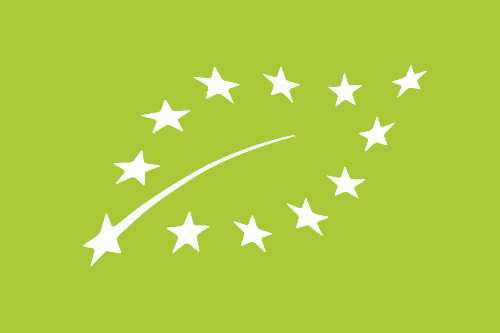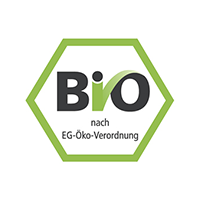For several decades, the production and processing of organic products has been subject to national and international regulations. The terms bio and öko are protected terms and may not be used for food-based products without certification.
The new EU Organic Regulation 2018/848 has been in effect since 01.01.2022, describing the requirements of the organic label at all stages of the value chain.
All companies that are certified according to the organic regulation are allowed to sell their products as organic products. They must adhere to the requirements of the regulation and receive the organic certificate at the end of a successful certification process by an organic inspection body. The company's own organic products may then be labelled with the official EU organic logo.
 |
 |
| EU-Bio-Label | German Bio-Siegel |
The organic label is one of the most recognised sustainability labels in Germany and internationally and enjoys a high level of trust among consumers.
Technically speaking, the Bio-Siegel refers to the hexagonal, national German Bio-Siegel. Few people are aware that the label does not have its own regulatory basis, so the requirements of the EU Organic Regulation apply in full. These requirements are audited and the EU organic logo (the rectangular logo with the leaf on a green background) must be displayed on every organic product as a mandatory label.
In addition to the mandatory EU organic logo, companies based in Germany may also use the national German Bio-Siegel. The organic label is therefore voluntary and may be used in addition to the EU organic logo for advertising the company's own products.
The fundamental principle of organic farming is the production of healthy food based on a balanced, fertile soil. The cropland must undergo a transitional period before the products sown and harvested there can be labelled as organic.
The EU organic regulation requires that associated farms must be managed according to the rules of organic farming for at least two to three years (depending on the type of produce). During production and processing, organically and non-organically grown products must be separated and contamination by prohibited substances must be avoided.
In addition to the legal requirements, we also also provide certification for private organic standards. The guidelines of the organic associations are based on the EU Organic Regulation. Additionally, each association sets its own and often more detailed requirements and guidelines, which differ from association to association. Your business will be audited by us on compliance with both requirements. Compliance with association guidelines is voluntary.
Here you can find our organic associations: